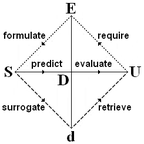Literature/1976/Weizenbaum
< Literature < 1976| Authors | ||
|---|---|---|
|
A B C D E F G H I J K L M N
|
| |
Wikimedia

In general indeed, the information system S upon enquiry E, unlike the autonomous robot or AI, must predict one or more probable "decisions" D yet to be discriminated, which the user U in turn must evaluate for the final "choice" to be made.
- ... displays his ambivalence towards computer technology and lays out his case: while artificial intelligence may be possible, we should never allow computers to make important decisions because computers will always lack human qualities such as compassion and wisdom. Weizenbaum makes the crucial distinction between deciding and choosing. Deciding is a computational activity, something that can ultimately be programmed. It is the capacity to choose that ultimately makes us human. Choice, however, is the product of judgment, not calculation. Comprehensive human judgment is able to include non-mathematical factors such as emotions. Judgment can compare apples and oranges, and can do so without quantifying each fruit type and then reductively quantifying each to factors necessary for mathematical comparison.
- ... argued that the misuse of artificial intelligence has the potential to devalue human life.
Wikimedia
Chronology
- Literature/1986/Dreyfus [+]
- Literature/1983/Dreyfus [+]
- Literature/1980/Searle [+]
- Weizenbaum, Joseph (1976). Computer Power and Human Reason: From Judgment To Calculation. San Francisco: W. H. Freeman. [+]
- Literature/1972/Dreyfus [+]
- McCarthy, John; Marvin Minsky; Nathan Rochester & Claude Shannon (1955). A Proposal for the Dartmouth Summer Research Project on Artificial Intelligence. [+]
Comments
Notes
This article is issued from Wikiversity - version of the Tuesday, September 30, 2014. The text is available under the Creative Commons Attribution/Share Alike but additional terms may apply for the media files.
